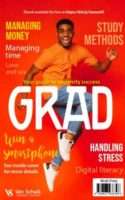Every day you allow to slip by without studying makes the next one more difficult. Self- discipline is so boring, but so effective. Once steady, regular studying according to your schedule becomes a habit, you don’t have to make a decision to study every time you do so. That will help, because otherwise it is so easy to say, “I’ll do it later” or “I can miss this class, I’ll catch up tomorrow.” That’s called procrastination: putting stuff off and telling yourself you’ll do it later. We may not know the word, but we all know the feeling!
Part of the reason that procrastination is so addictive lies in your brain. When you think of something that you don’t want to do, the “pain spot” in your brain is activated in the same way as if you had stubbed your little toe against a sharp corner. Thinking of something else gives relief, even if it’s only for a while. That feeling of relief can get addictive.
The good news is that research shows that the same relief can be achieved simply by starting a small part of the job you are avoiding. “A small part” is also an important idea. The brain wants to protect you from becoming too tired, so it doesn’t like you taking on a huge job. If you divide the job into smaller bits, you can fool the brain into accepting it. Studying comes in different shapes and sizes. Use all your available hours wisely.
CLASS TIME
Stay up to date with the work and prepare for the next class. Proper preparation, also called “priming your mind”, is one of the most under-utilised time-saving techniques. Your brain will automatically make connections if it has been introduced to the main concepts before class.
Make sure you’re on time and concentrate when the lesson or lecture starts, so that you hear the introduction, which often frames the day’s work. Concentrate and take notes. Try to follow the flow of the lesson..
STUDY TIME Like all jobs, studying is not always going to be easy or fun. Some things you will find boring. Other things you may find impossible to understand. Hold on to a few thoughts: You are here for a reason. Remember your goal. Remember how this course you have to work at now fits into that bigger picture.
Henry Ford, who built the world’s first car factory, said: “Whether you say you can or you say you can’t, you’re right.” Believe that you can, and that’s half the battle won. Thousands of others have done it. You can too.
The more attention you give to a piece of work, the better you will understand it and the more interesting it will become. That obscure poem that was just a jumble of words the first time you read it may be the one you take into life with you.
Stanford psychologist Carol Dweck distinguishes between people who believe that intelligence is fixed, and people who believe it is capable of growth. If you believe it is fixed, learning feels like a never-ending struggle against your own shortcomings. If you believe it can grow, learning feels like exercise to become fit, and failures (e.g. a failed test, something you initially cannot understand) are stepping stones to greater ability. Change your mindset from “fixed” to “growth”.


